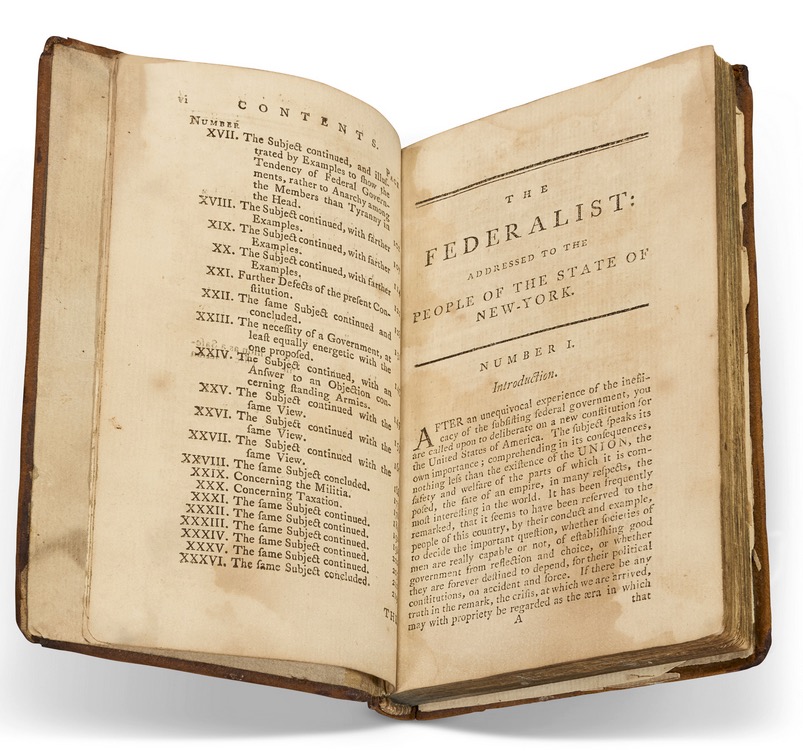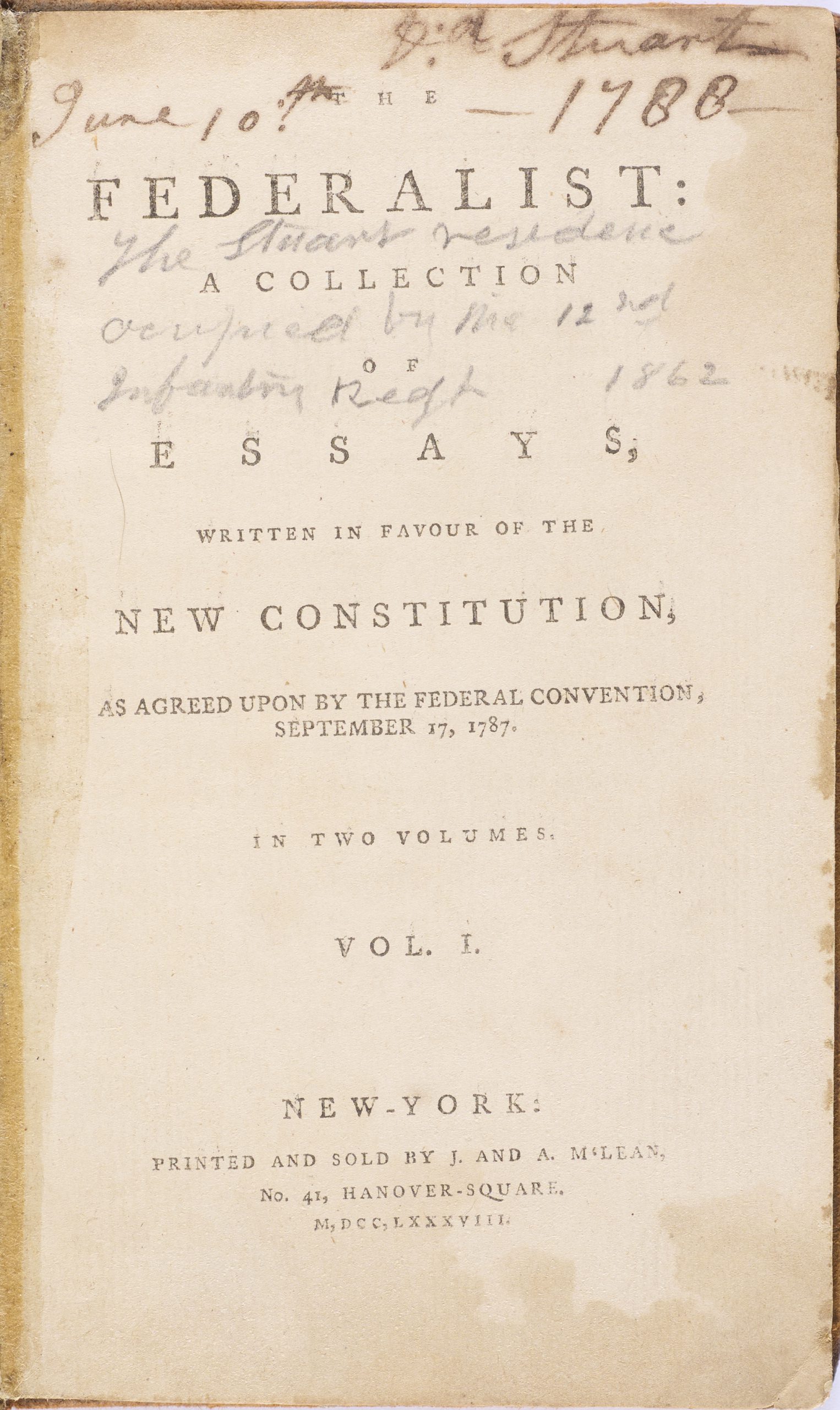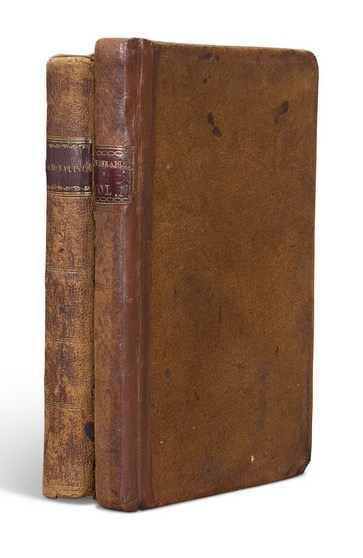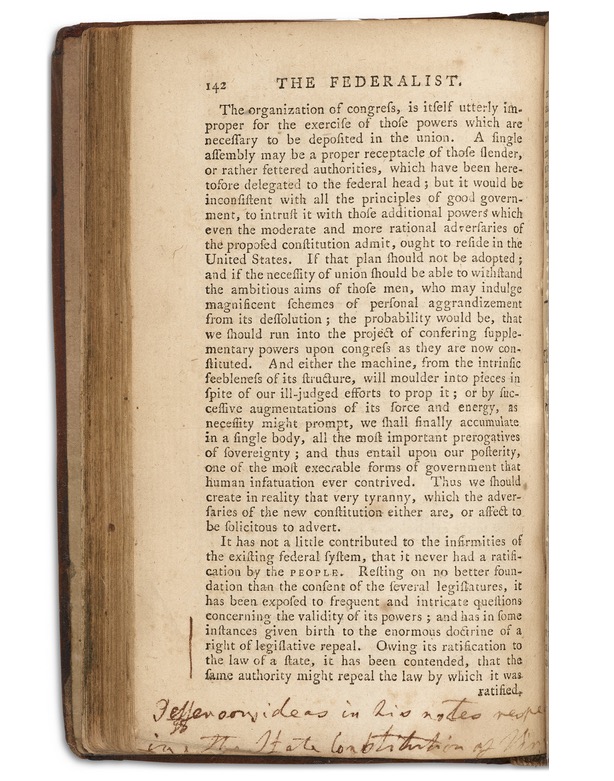George Washington family copy of The Federalist
[HAMILTON, ALEXANDER, JAMES MADISON, & JOHN JAY.]. The Federalist: A Collection of Essays Written in Favour of the New Constitution.
New York: John and Andrew M’Lean, 1788
Two volumes. Contemporary reversed calf, red leather spine label, front joint restored, without free endpaper (vol. 1); contemporary calf, red leather label (vol. 2). Annotations sometimes cropped. Normal spotting and browning, wear, minor staining. Provenance: Vol. 1: David Stuart, 1753-1814, (ownership signature dated 6 June 1789) – a member of the 12th Massachusetts Infantry, 1862 (pencil inscription on title page). Vol 2: “Storm[?] 1796” (ownership inscription on front endpaper) – R. Reynolds (ownership inscription dated Baltimore, Maryland, 17 March 1873) – Carl Spices (ownership inscription dated 25 November 1957).
George Washington family copy of the first edition of The Federalist. This is an important association copy of the central book of American political philosophy, signed and dated June 10, 1788 in the first volume by Dr. David Stuart, George Washington’s relation and political confidante.
A SUPERB WASHINGTON-CUSTIS FAMILY COPY. Dr. David Stuart became a member of the Washington family in 1783 when he married Eleanor Calvert Custis, the widow of Martha’s son John Parke Custis. John and Eleanor had had four children (from eldest to youngest: Elizabeth Parke Custis, Martha Parke Custis, Eleanor Parke Custis, and George Washington Parke Custis). Following the second marriage, the older two lived in Alexandria with their mother and stepfather, Eleanor Calvert Custis and Dr. David Stuart, while the younger two lived at Mount Vernon with their grandparents, George and Martha Washington.
Visits between the two households were frequent, and David Stuart soon became an intimate of and advisor to George Washington. Washington and Stuart corresponded for years on the most personal of matters including family issues, financial decisions, sensitive political issues, and the establishment of the Federal City, later known as Washington D.C. After George Washington’s death in 1799, Martha relied on Dr. Stuart to manage her affairs.
Stuart is remembered as George Washington’s confidant, the Washington family representative in the Virginia legislature, a delegate to the Virginia constitutional ratification convention, and one of the three commissioners for the establishment of the District of Columbia appointed by President Washington. Stuart served Washington, during the critical days of the debate over the Federal Constitution, as his secret agent for ensuring the publication of the Federalist Papers in the Virginia press.
Washington was deeply aware of the significance of the publication of The Federalist in the debate over the proposed Constitution. At the same time, Washington characteristically wished to maintain a low profile during the ratification debates. Thus he called on his friend Dr. Stuart to get The Federalist into print in the Virginia newspapers while concealing his involvement. In a letter to Stuart dated November 30 1787, Washington wrote:
“I am sorry to find by it that the opposition is gaining strength. At this however I do not wonder. The adversaries to a measure are generally, if not always, more active and violent than the advocates; and frequently employ means which the others do not, to accomplish their ends. I have seen no publication yet, that ought, in my judgment, to shake the proposed Government in the mind of an impartial public. In a word, I have hardly seen any that is not addressed to the passions of the people; and obviously calculated to rouse their fears. … That there are some writers (and others perhaps who may not have written) who wish to see these States divided into several confederacies is pretty evident. As an antidote to these opinions, and in order to investigate the ground of objections to the Constitution which is submitted to the People, the Federalist, under the signature of Publius, is written. The numbers which have been published, I send you. If there is a Printer in Richmond who is really well disposed to support the New Constitution he would do well to give them a place in his Paper. They are (I think I may venture to say) written by able men; and before they are finished, will, if I am mistaken not, place matters in a true point of light. Altho’ I am acquainted with some of the writers who are concerned in this work, I am not at liberty to disclose their names, nor would I have it known that they are sent by me to you for promulgation.”
Stuart’s marginalia reveals a close reading of the text. He even takes time to identify the various authors noting Jay’s authorship of Number 3, as well as “Mr. Madison as the writer of Number 10, where, on page 54, he appears to draw a parallel to British politics besides Madison’s definition of “faction” as “a number of citizens … who are untied and actuated by some common impulse of passion, or of interest, adverse to the rights of other citizens, or to the permeant and aggregate interests of the community.” Stuart appears to have written: “[B]ritish to have envise[d] [s]uch a [fac]tion.” In Federalist No. 11, Stuart offers two comments on Hamilton’s exposition on the importance on the need for a navy to protect American commerce. The first is in reference to Hamilton’s assertion that even a small Navy, although likely unable to “vie with those of the great maritime powers, would at least be of respectable weight if thrown into the scale of either of the two contending parties.” Here Stuart makes reference to a similar point made by James Madison, and likely citing comments made by Madison in Federalist no. 41. On the opposite page, Stuart makes a comment on Hamilton’s assertion that the country could only remain neutral in European conflicts if it had a strong defense.
Although known as staunch Federalist, Stuart could also be critical of the proponents of the Constitution. On page 71, Stuart appears to take a swipe at Hamilton in Federalist No. 12. There, Hamilton opens by expressing astonishment that the “simple truth” that commercial prosperity is “the most productive source of national wealth,” should be questioned, Hamilton lays the blame on, “a spirit of ill informed jealousy or of too great abstraction and refinement….” Stuart underlines “ill informed jealousy,” and in the margin, writes, “the author is himself a melancholy proof of this.” Yet, at the conclusion of Number 22, Stuart agrees with Hamilton’s lament that the powerlessness of the Confederation Congress had given rise to the “to the enormous doctrine of a right of legislative repeal.” Below the paragraph he comments that it echoes “Jefferson[‘]s ideas in his notes repeal in the State Constitution of Va.” Ironically, Stuart’s comment also anticipates the rise of those factions that the authors of the Federalist so feared and detested.
This is one of only a handful of great association copies of The Federalist to become available in our lifetime. This book was owned by the man entrusted by Washington as a key advisor, intellectual sounding board, and secret agent for the spread of The Federalist.
“[The Federalist] numbers which have been published I send you. If there is a Printer in Richmond who is really well disposed to support the New Constitution he would do well to give them a place in his Paper. They are … written by able men; and before they are finished, will, if I am mistaken not, place matters in a true point of light. … ” – George Washington to David Stuart, November 30, 1787
$250,000






